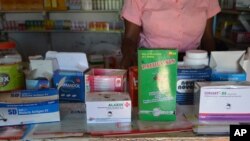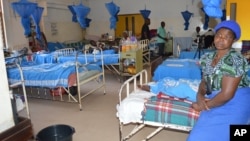Malawi is trying to stop the rampant theft of malaria medicines from its public hospitals. A recent study found the robberies are costing the country millions of dollars each year, and the United States has threatened to stop providing the drugs if authorities do not get the situation under control.
Malaria is the cause of 40 percent of hospital deaths in Malawi, according to the Ministry of Health. It is the cause of over a quarter of outpatient visits.
The U.S. government and the Global Fund to Fight AIDS, Tuberculosis and Malaria provide Malawi’s public hospitals with nearly all of their stock of life-saving malaria treatment drugs. By law, those medicines should be distributed free of charge.
But a recent study by the Ministry of Health revealed that 30 percent of those malaria drugs are stolen from the Central Medical Stores warehouse in the capital, Lilongwe. Seventy percent of what remains is disappearing from medical facilities around the country, the study found.
Edward Monster, the public affairs officer at the U.S. embassy in Malawi, says the stolen drugs end up being sold on the street.
“Instead of the government pharmacy providing that medication free of charge to Malawian citizens that need it, they are told at [the] government’s pharmacy that there is no medication available. But they can go down the road to a market place and buy the medication for a fee. That is, unfortunately, criminal,” Monster said.
The U.S. and the Global Fund have partnered with Malawi on two campaigns to allow Malawians to report suspected theft using a toll-free number or by email.
“And I would like to point out that under the “Make a Difference” campaign which is funded by the United States government, there are actually cash rewards that can be paid to people who provide credible, usable information that will lead to conviction of the thieves who are stealing these malaria medications,” Monster said.
Penalties seen as too lenient
But health authorities say the penalties laid out in the Pharmacy, Medicines and Poison Act are too lenient.
Adrian Chikumbe, spokesperson for the Malawi’s Ministry of Health, says several culprits have been arrested but then released after paying small fines.
“If one steals drugs worth millions (of Malawian kwacha), [he] is fined MK 5,000 (US$7). That is almost nothing. So we are actually working with the parliamentary committee on health so that we could have this law reviewed so that we have stiffer punishment,” said Chikumbe.
The chairperson of the parliamentary committee on health told VOA that stiffer penalties are needed. She said the committee is in the advanced stages of reviewing the law.
Medical staff are believed to be involved in the theft of the medicine and some local rights groups also point to high-level corruption.
The president of the National Organization of Nurses, Joyce Ngoma, said the health system needs an overhaul from the top down.
“You find that the thieves and all the culprits, we know them. They have been named and shamed before. And [they] are the ones who have been promoted and given the jobs now to be in charge. What do you expect?” Ngoma asked.
Authorities say they will act on all tips received from citizens and this time, no perpetrators will be spared.





